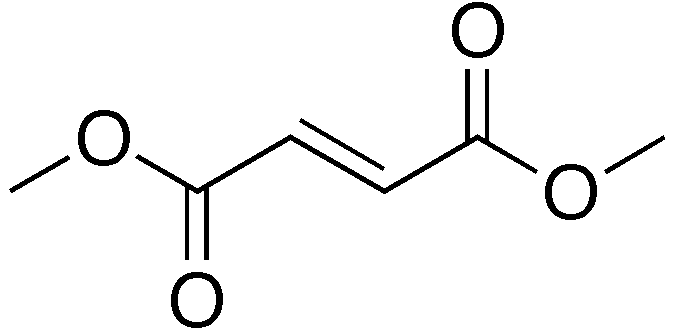Q1. What is Dimethyl Fumarate (DMF)?
A1.
Dimethyl Fumarate – DMF (CAS Number 624-49-7) is a biocide occasionally used as an additive to some types of
desiccant materials or by itself to prevent mold growth (anti-fungal agent). It is known to have been used for protecting leather goods such as shoes and furniture by being added as an ingredient in some types of desiccants used in the packaging of these commodities.
Q2. What is the concern with DMF?
A2. According to the European Commission, contact with DMF in concentrations >1mg/kg (>1ppm) may result in severe allergic skin reactions for some individuals. The European Commission determined that a maximum limit of 0,1 mg/kg appropriately addresses the risk from DMF in products.
Q3. What is desiccant?
A3. Desiccants are used for removing moisture and therefore are widely used in packaging applications. X company uses desiccants for protecting many types of parts and products, especially, but not exclusively for items being shipped via ocean vessel. Users may recognize them as small fabric or paper pouches with granulated desiccant material inside. There are many types of desiccants; silica gel is one common type that apparently has been known to include DMF as an additive to combat mold growth. However, many types of silica gel are DMF free.
Q4. If DMF is used primarily for protecting leather goods, why is X company concerned?
A4. Desiccant is a general commodity often used to protect a wide variety of goods including electronics to prevent corrosion of metallic surfaces. Therefore, it is important to verify that DMF is not inadvertently used in any packaging materials including desiccants that accompany X company parts or products or other items imported on behalf of X company.
Q5. When did this restriction become effective?
A5. The EU decision became effective beginning on May 1, 2009. The decision primarily imposes requirements on the EU member states and is therefore subject to formal transposition by the EU states into local or national law. Note that some countries – including but not necessarily limited to Italy, Belgium, Spain and France – already have regulatory measures regarding consumer health from the biocide DMF. Italy has been aggressive in its enforcement including the requirement that all packages must be accompanied by a Declaration of Conformity signed by the shipper and written on company letterhead backed up by test reports (on file) from an ISO-17025 certified laboratory proving the absence of DMF.
Q6. How do I know if the desiccants we’re using are DMF free?
A6. To our knowledge, there is no visual cue other than specific desiccant manufacturer’s names printed on desiccant pouches and such print alone cannot be used for compliance. First, contact your desiccant supplier; otherwise, you may contact your shipper for assistance in identifying compliant sources.
Q7. Is it acceptable to simply quit using desiccants to avoid the issue altogether?
A7. No. If desiccant is part of the packaging specification then it should remain. Where desiccants are specified by X company or other manufacturers to be used for protecting a particular item, they must be used. There are many compliant types of desiccant available as well as other ways to protect electronic products from corrosion or other damage that may be caused by moisture. X company responsible for the product in question will make the final
determination regarding the need for desiccants and/or appropriate technical alternatives.
Q8. What is the current situation in ITALY?
A8. Italy had previously (since May, 2009) implemented strict inspection practices with regard to imports from non-EU countries. All packages being imported to Italy from any non-EU country were subject to inspection by Italian customs authorities.. The Italian Customs authorities previously only cleared shipments with a “Shipper Declaration of Conformity” document. However, as of March 16, 2013 they have elected to DISCONTINUE this requirement!
Important: Shipments must still be compliant (free of DMF) but the presentation of signed declarations of conformity to this requirement accompanying all non-EU imports into ITALY is no longer required. Customs (in any country) reserves the right to ask for a declaration to confirm the absence of DMF – or the presence of the DMF under 0,1 mg/kg – in the same way Customs has the right to ask for validating the HS code, for proof of payment, or any other declaration in case the shipment is stopped for additional controls at the arrival at the port of entry. They also have the right to reverse this decision at any time.
Q9. What desiccant manufacturers have already affirmed compliance to the DMF restrictions?
A9. We understand that the following suppliers have provided written declarations of no DMF and/or have provided laboratory test reports affirming the same. We provide this information for your information only. We do not endorse any of these suppliers and we look to you to do your own research and due diligence to confirm that there is no DMF in products you get from any supplier. As we get more information, we may (but are not required to) update this list.
- Desiccare
- Pro-Pack
- Sud-Chemie
- Dese Camen
- Quimy-Terra (made by Desiccare)
- Liyingda
- Riz Hao Rongtai
- Jian Wei
- Pro-Tech
- Micro-Pak
- 3M (made by Desiccare)
- HLC Vietnam
Q10. Does it matter what the size of the pouch is?
A10. No, the EU directive focuses on concentration, not size. The restriction is based on 0.1mg/kg concentration limit regardless of the pouch size. That is the same as 0.1 parts per million (PPM) or 100 parts per billion (PPB)
Q11. I have a Material Safety Data Sheet (MSDS) from my supplier, is this equivalent to a manufacturer’s test report?
A11. No. A MSDS is not likely to identify DMF at concentrations that are restricted, even if it was present. Therefore, a laboratory analysis specifically looking for DMF at concentrations equal to or below 0.1mg/kg is required.

